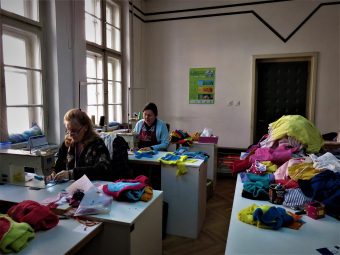
Women’s Centre Užice (WCU) was registered in 1998, resulting from an initiative made by 15 women and with the aim to start discussing the real status of women, their rights, and abilities at the local level. First programs were aimed at developing health, education, and economic programs to empower women from vulnerable groups. In time, the health program grew into the Breast Cancer Centre Jefimija, the Program for Combating Gender-Based Violence was launched, and the SOS hotline for victims of domestic violence was established.
The economic program experienced a real boom when in 2010 the idea was born to launch a collecting and textile recycling program (Retex). One of the initiators of the Retex program today is its Managing director, Marina Tucović, a textile technology engineer with experience gained in the textile companies Yumco and Frotex. And ever since, Women’s Centre Užice has been actively engaged in collecting textiles, their reuse, and recycling, giving them to those who need clothes, and creating new products. Currently, their work is focused on the idea of opening a Regional Centre for Textile Waste Disposal, within which they would produce recycled textile fibre, for which they need the support of investors and the wider community. Marina Tucović, who has been awarded numerous recognitions for her work, will tell us more about all the benefits of Retex and some other activities of the Women’s Centre Užice.
EP: Where did the idea to start a textile recycling program come from?
Marina Tucović: As an initiative, textile collection and recycling was launched in 2010 as a project, resulting from the indicators recognizing employment needs of women from vulnerable groups who are not competitive in the labor market (women with disabilities, single mothers, women victims of domestic violence, women over 50) and the need local communities to improve the quality of the primary waste selection system. As an innovative model of waste textile disposal, unique in the territory of Serbia, the project was designed in accordance with the technological characteristics of waste textiles. The main pillars of our work are the principles of solidarity economy and sustainable development. Retex employs six women from various vulnerable groups, and thanks to the Public Works Program by NES, we can hire more women from time to time. For most women who work at Retex, this is their first job, and their enthusiasm and willingness to overcome all the challenges of this line of work is the greatest satisfaction for our work and the development of this concept in the future. So far, we have succeeded in our attempts to assist two of our colleagues in exercising their right to disability pension, which is a great success for our compact team.
In focus:
EP: What is the basic idea behind Retex, and what does the whole turning old-to-new process look like?
Marina Tucović: Our idea was based on a concept aimed to extend the life of waste textiles, bearing in mind the fact that the textile industry has a detrimental impact on the environment, both in terms of the production process (emissions, wastewater, majority of synthetic fibres are derived from petroleum products), and in the waste category (short service life, extended decomposition life, emissions). We get old textiles from the people, then we sort them, usable part is then donated, and the good fabric is used to make new products. Textiles unfit for use go to a landfill. Our concept includes its own development phase, which is not only the production of recycled fibre that enables the treatment of residual textiles not fit for use in previous processing stages but also to include waste generated in the textile industry. The production of recycled fibre would complete the whole concept of solving textile waste. Recycled fiber has its application in the industry of technical textiles for the production of sound, heat, and other types of insulation.
EP: Who is involved in the process of collecting textiles?
Marina Tucović: The textile collection and recycling initiative is based on cooperation with the general population and their willingness to donate textiles. In the beginning, only locals, people who live in the Zlatibor district, used to send the textiles, but now we get textiles from all over Serbia, and we already have a problem with the lack of space for reception and storage. We also have a significant number of calls from different companies who would like to send us used work uniforms and some textile companies who wish to donate post-industrial waste textiles. Our experience so far shows the great willingness of people from all over Serbia to participate in this process, which is substantiated by the fact that the largest number of citizens have been bringing textiles since 2010.
EP: What are the benefits of the Retex program for all those who participate in it?
Marina Tucović: What we have seen so far is that our concept has undoubtedly changed the lives of working women in general, especially regarding their socio-economic empowerment (they got their first job, got the opportunity to help others, and become visible in their community). The great willingness of the general population to donate textiles is a certain indicator that the concept of primary selection of household-generated waste is accepted. In general terms, our work contributes to creating conditions for the infrastructural development of the disposal of textile waste in Serbia. This segment is very important, both from the aspect of environmental protection and from the aspect of achieving the goals of the 2030 Sustainable Development Agenda.
Interviewed by: Milica Radičević
Read the story in the new issue of the Energy portal Magazine RECYCLING.

